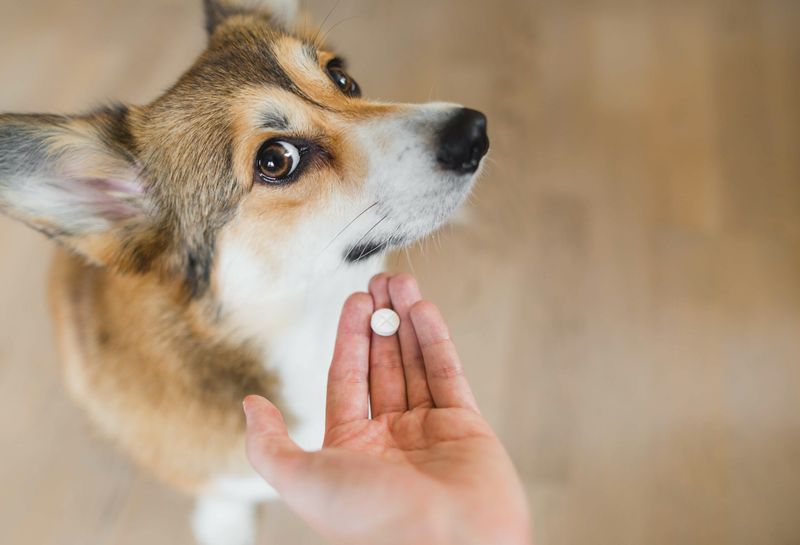Risks And Side Effects: 12 Essential Facts About Giving Your Dog Melatonin

Melatonin is often hailed as a sleep savior for humans, but when it comes to our four-legged friends, the story gets a tad more complex. As pet owners consider this supplement for their canine companions, they must wade through a sea of questions and concerns.
Is it safe, effective, or even necessary? We’ll explore critical insights that every dog parent should know before reaching for that melatonin bottle.
1. Understanding Melatonin’s Role

Melatonin isn’t just a fancy sleep potion; it’s a hormone produced by the pineal gland that regulates sleep cycles. For dogs, as with humans, it can help manage sleep disorders or anxiety. However, it’s crucial to understand that not all dogs respond the same way.
Your pup might feel like they’re on cloud nine, while others may not notice a difference. Before deciding to introduce melatonin into your dog’s bedtime routine, it’s wise to consult with your vet. They can guide you on the right dosage and whether it’s suitable for your dog’s specific needs.
A little precaution can prevent a heap of trouble later. As you tuck your dog in at night, remember that while melatonin might be a gentle nudge towards dreamland, it’s not a miracle worker.
2. Potential Side Effects

Every rose has its thorn, and melatonin is no exception when it comes to side effects. While generally safe, some dogs might experience tummy troubles such as nausea or diarrhea. It’s also possible for your furry friend to become a bit too lethargic, turning their usual playful antics into prolonged napping sessions.
Keep an eye on any behavioral changes post-melatonin, and if you notice something amiss, skip the guesswork and contact your vet. It’s better to be safe than sorry. Remember, your dog’s health is not just a subject of scientific curiosity, but a matter of the heart.
3. Dosage Dilemmas

Finding the right dosage of melatonin for your dog isn’t as simple as one-size-fits-all. Factors like your dog’s size, age, and health condition play a pivotal role. A Chihuahua won’t need the same amount as a Great Dane, and giving too much can lead to unwanted side effects.
Always start with the lowest possible dose, and adjust according to your vet’s advice. Consistency and careful monitoring are key. It’s like finding the perfect balance in a recipe; too much or too little can throw everything off. So, tread cautiously, and let your vet be your guide through this dosage dilemma.
4. Interactions with Other Medications

Combining medications can sometimes create unexpected fireworks, and melatonin is no exception. If your dog is already on other medications, particularly for conditions like anxiety or seizures, melatonin might interact in ways that are less than ideal.
It’s essential to have an open discussion with your vet about your dog’s current medication regime before adding melatonin to the mix. Being proactive can prevent unforeseen complications, ensuring your dog’s health remains in check.
Imagine it as a cocktail party where every guest, or in this case, every medication, needs to get along without causing a scene.
5. Natural vs. Synthetic Melatonin

Not all melatonin supplements are created equal. Some are derived from natural sources, while others are synthetic. For your dog, the difference might matter. Natural melatonin is often touted as the safer choice, but it can come with inconsistencies in strength and quality.
Synthetic versions offer a more controlled dosage, eliminating some guesswork. Discuss with your vet the pros and cons of each type, and choose the one that best suits your dog’s needs.
Consider it like choosing between organic and conventional produce; both have their merits and drawbacks, and your decision should be informed by your dog’s specific requirements.
6. Timing Matters

Timing is everything, especially when giving melatonin to your dog. Administering it at the right moment can make all the difference in its effectiveness. Generally, giving it 30 minutes before bedtime allows it to work its magic as your dog winds down for the night.
However, each dog’s internal clock may tick differently, requiring some experimenting to find the perfect timing. Think of it as setting the stage for a bedtime play; the curtains rise and fall with precision, and so should your dog’s melatonin schedule. A little patience and observation will go a long way.
7. Melatonin for Anxiety

If your dog turns into a quivering ball of nerves during thunderstorms or fireworks, melatonin could be a calming ally. Known for its sedative properties, melatonin can take the edge off such stressful events, helping your pooch find their zen.
However, it’s not a blanket solution for all anxiety types. For some dogs, long-term anxiety may require a more comprehensive treatment plan. Always consult with your vet to tailor the best approach for your dog.
Imagine melatonin as a comfort blanket that can wrap your dog in calmness when the world outside seems a bit too loud and overwhelming.
8. Pregnancy and Nursing Considerations

When it comes to giving melatonin to pregnant or nursing dogs, it’s a journey into unknown waters. The effects on developing puppies are not well-documented, so most vets recommend erring on the side of caution. If your pregnant or nursing dog is experiencing anxiety or sleep issues, consult your vet for safer alternatives.
Navigating this period is like sailing uncharted seas, where careful navigation ensures the safety of all aboard. Your vet can be the compass guiding you through these sensitive times, ensuring the health and well-being of both mother and pups.
9. Consulting Your Vet

Before introducing melatonin into your dog’s life, a conversation with your vet is paramount. They can provide insights and recommendations based on your dog’s health history and current needs. It’s like having a co-pilot on your journey through pet parenting, ensuring you make informed decisions.
Your vet can also monitor your dog’s progress and make adjustments to the melatonin regimen as needed. Think of them as your dog’s health guardian angel, always watching over to ensure a happy and healthy life. Their expertise is invaluable when venturing into new territories of canine care.
10. Long-term Use Implications

Considering melatonin for long-term use in dogs requires careful thought. While it might seem like a convenient solution for ongoing issues, prolonged use can potentially mask underlying health problems that need attention.
Continuous monitoring and regular vet consultations are crucial to prevent dependency and assess the supplement’s effectiveness over time. Imagine it as maintaining a garden; regular care and evaluation ensure everything thrives without unwanted weeds taking over.
Keeping an eye on your dog’s long-term health is vital to make sure melatonin remains a helpful aid rather than a crutch.
11. Age-Specific Effects

Melatonin can affect dogs differently depending on their age. Puppies might react more sensitively compared to seniors, whose systems are a bit slower but also more resilient to changes. Understanding these age-specific reactions can help you tailor the melatonin regimen to suit your dog’s stage of life.
Consult with your vet to determine the appropriate dosage and observe your dog’s response closely. Consider it like choosing age-appropriate activities; each stage of life brings different joys and challenges, and melatonin use should adapt accordingly.
Always keep an eye out for any changes to ensure your dog remains at their happiest and healthiest.
12. Alternatives to Melatonin

While melatonin is a popular choice, it’s not the only game in town. Some dogs might benefit from alternative remedies like calming treats, pheromone diffusers, or natural herbs like chamomile and lavender. These options can be particularly appealing to pet owners looking for a more holistic approach to their dog’s well-being.
Exploring these alternatives with your vet can provide additional tools in managing your dog’s anxiety or sleep issues. Think of it as expanding your toolbox; the more tools you have, the better equipped you are to handle any situation. Variety and creativity in solutions can often lead to the best outcomes for your furry friend.
